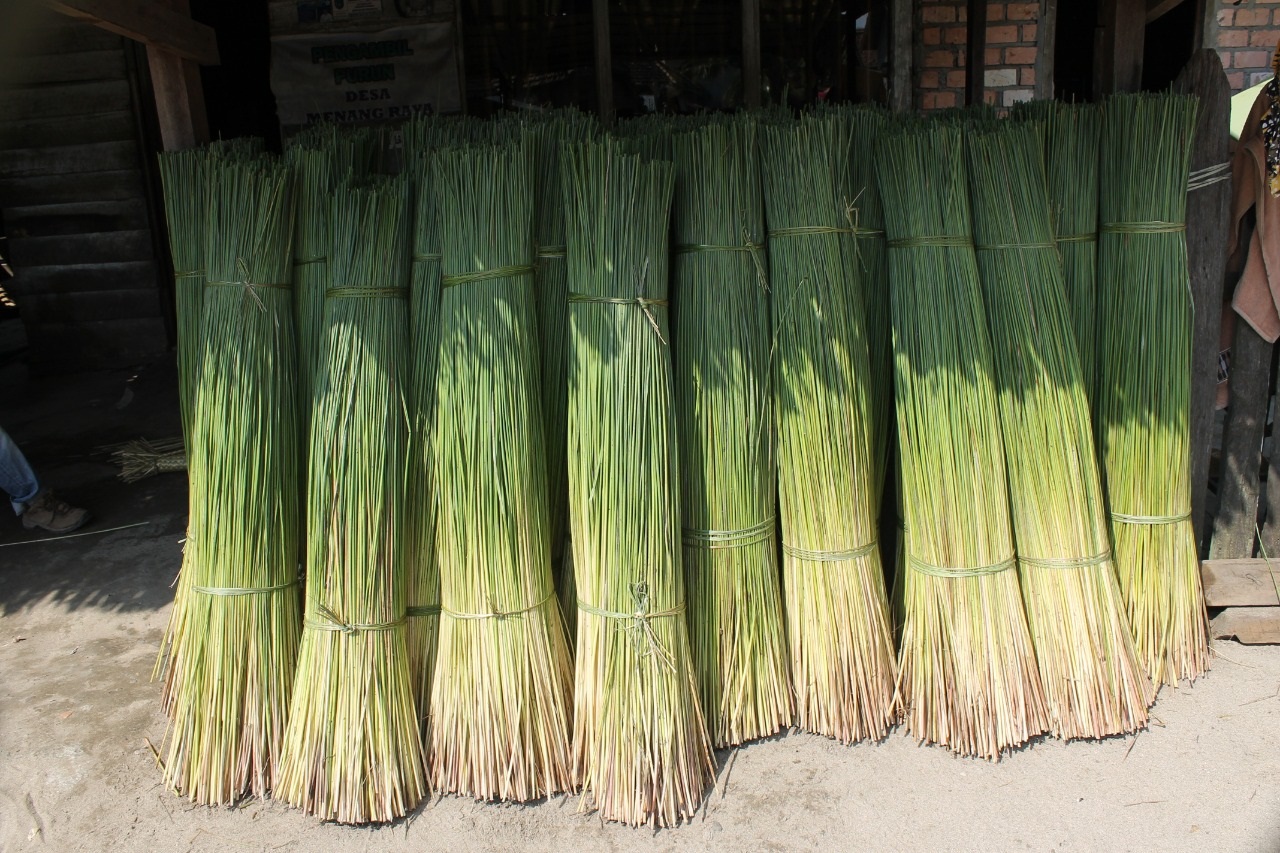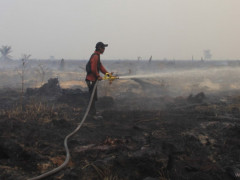Jambi Farmers Named as Forest and Land Fires Suspects, What About the Companies?
By Yitno SupraptoInheriting the Tradition of Caring for Nature
Depiana (36) seemed very skilled in weaving each piece of dried purun (Lepironia articulata) to make a mat. She did not feel bothered at all even though her 3-year-old youngest child was playing by her side.
To Depiana and women of the Pandesak tribe in Menangraya Village, Pedamaran Subdistrict, Ogan Komering Ilir (OKI) District, weaving purun mats, or berempak in the local term, is local wisdom that is inseparable from their lives, as well as a source of the community's economy.
This purun weaving activity is part of their lives because the Pedamaran people live around 120,000 hectares of peat swamps, which is the original habitat of purun plant. It's no wonder that Depi, Depiana's nickname, has inherited this hundreds-year-old craft since she was in elementary school.
“Every day we, the housewives, weave purun mats. We got this weaving skill from our grandmothers,” said Depi, while showing her fingers’ agility in weaving each piece of purun. "Most women here can weave," this mother of four children continued.
She said that as time goes by, the preserved tradition has become a source of income for Pedamaran people. They can help their husbands who are the main breadwinner in the family.
“For people who own land, they can get extra income from weaving. But for those who don't own land, this is their main source of livelihood,” said Depi.
Opportunities and challenges
The purun plant is now under threat due to the rapid investment in oil palm plantations and industrial plantation forests (HTI), which generally control the peatlands in South Sumatra, particularly in OKI District.
The conversion of peat forests often triggers forest and land fires during the dry season, as happened in 2015-2019. Besides causing environmental damage, land conversion also threatens the continuity of traditions and additional livelihoods (from weaving purun) that have long supported the local community's economy.
Currently, each woman in Menangraua Village, Pedamaran Subdistrict, can make three to four mats a day on average. They don’t earn a lot from these woven mats. Although it's relatively difficult to make a 2x1-meter mat, the collectors only purchase it at IDR 10,000.
“The net profit from their hard work is only IDR 3,000 per mat. The remaining IDR 7,000 is the raw material cost,” said Rusmini (53), Head of the Purun Weaving Group in Menangraya Village.
Regarding the threat of further conversion of peatlands into plantations, Rusmi said that maintaining purun on peatlands is very important because they need to preserve the tradition of purun weaving and it is also an alternative source of livelihood for the surrounding community. "If the peat ecosystem is destroyed, the weaving tradition will definitely become extinct," she said worriedly.
Rusmi and her fellow residents have taken a step in maintaining this tradition for the last five years, which is by forming purun craft weaving groups. There are at least eight mat weaving groups in Menangraya Village, with 20 to 30 members per group.
Through these purun craft groups, they receive training to create other woven crafts, not just mats. From the same raw materials, they learn to innovate and make handbags, hats, skull caps, hotel sandals, and other crafts that have a higher economic value.
“But it is difficult for us to sell these crafts. We only make them based on orders that mostly come from government agencies. They will show our products in exhibitions,” she said.
The Head of Menangraya Village, Pedamaran Subdistrict, Suparedi, said that the OKI District Government is not serious about these purun crafts and the conversion of forests or lands into industrial plantation areas is still happening. In 2018, the Ministry of Education and Culture, through Ministerial Decision Number 264/M/2018, has recognized this weaving craft as a tradition or culture of the Pedamaran people and as Indonesia's Intangible Cultural Heritage.
"The Pedamaran women's farmer groups have held two demonstrations at the District Head’s office, demanding that the government as policy maker should issue a regulation to preserve the peatlands where purun plants grow," he said.
He explained that purun is not just a business run by the Menangraya women to support the local economy, but more importantly, the craft that has been around for a long time, which has been passed down from generation to generation, is a cultural heritage and identity that needs to be preserved.
“I can't imagine if the company blocks the area where purun grows, which is usually used by the community. This means that purun will disappear. If purun disappears, our identity, a legacy from our ancestors, will also disappear," he said.
Marginalized
The monoculture plantation industry, especially oil palm plantations, has further narrowed the space and local wisdom of the Pedamaran people whose livelihoods depend on peat swamps.
Concession permits provide the widest possible space for investors and even confiscate customary forests that have been the community’s source of livelihoods. People can no longer access the land around the company's concession, where they used to collect purun and fish.
"Many of our youths of productive age work as casual laborers in the oil palm plantation company," said Hasbi (63), who faithfully tends to a 1.5 hectare land in Lebak Purun.
He admitted that the people’s hope for the plantation industry to improve their welfare is just a figment. A decade ago, there were many conflicts between the community and the company, and the community could not do much.
“It is very difficult nowadays. The lands have been divided into lots. Prices of agricultural commodities are low.” he said.
Hope for the future
To encourage sustainable purun business development, since 2020, Eco Fesyen Indonesia has implemented the Peat and Mangrove Restoration Agency (BRGM) Incubator Program, which is funded by the Norwegian government and managed by the United Nations Office for Project Services (UNOPS). The purpose of this activity is to increase the community's commitment to conserving plants while maintaining the area where purun grows as part of the village spatial plan to improve the welfare of the community, especially in Menangraya Village, Pulau Geronggang Village, and other villages. This is also in line with the theme of World Environment Day “Ecosystem Restoration”.
"Purun that grows on peatlands is only processed into woven mats, even though it can be developed into fashion products with high economic value. Of course, this requires a mentoring process," said Merdi Sihombing.
He explained that this incubator program is expected to help improve the welfare of people living around peatlands and become part of the efforts to mitigate climate change.
"This activity will support peatland restoration efforts. We consider that the communities are aware of this and will actively participate in protecting the conservation areas," said Eko Agus Sugianto, Secretary of the South Sumatra Peat Restoration Team.*




